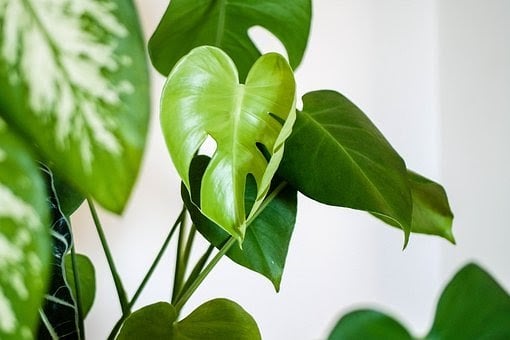Caring for Houseplants Through the Winter Months

Even though they're inside, your house plants might still need some extra maintenance in the winter. Learn how to take care of all your indoor plants in the cold months.


Even though they're inside, your house plants might still need some extra maintenance in the winter. Learn how to take care of all your indoor plants in the cold months.
Whether you have hanging plants in front of every window or a small cactus on the mantel, houseplants are a great addition to your home decor. Their green leaves and beautiful blooms bring a touch of the outdoors into your living space, and they can really brighten up your home and mood during the dreary, bleak winter months. Additionally, some potted plants that you may keep outside on the patio or deck during the summer won’t survive cold winter temps and need to be brought inside.
But caring for your houseplants during the winter is a little different from caring for them during the summer. Plants go dormant during the winter, when shorter days, drier air, and cooler temperatures make them vulnerable. Nurse your plants through the cold months with these tips for indoor plant care in the winter.
If you really want your houseplants to thrive during the colder months, you need to make sure they’re optimally healthy before the seasons change. Give each plant the care it needs to thrive during the warmer months, and set it up for winter success with a last boost of fertilizer before temperatures drop.
Most plants enter a dormant phase during the winter, but you might not notice it. For many species, it just means they stop growing. Some, like cyclamen, will wither up and dry out, appearing as if they have died. And it’s normal for some plants, like ficus, to drop some of their leaves as they prepare to conserve resources in the winter.
Since your plants aren’t actively growing in the winter, they need less water. Overwatering in the winter can lead to root rot. Most plants need watering only when the soil is dry to an inch or two below the surface and just before it starts to shrink back from the sides of the pot. Don’t water more if plants drop leaves in the winter — remember, that’s normal. Stay vigilant for signs of overwatering, which include yellowing leaves, insects, and mold on the soil. When you do water plants, make sure the water is about the same temperature as the room, so you don’t shock the roots.
Plants prefer humidity levels of about 50 percent, but the combination of dry winter air and home heating can leave indoor humidity levels as low as 10 percent. Add a humidifier to the room where you keep your plants to compensate or move them into the kitchen or bath. If you can’t do either, place plants in a tray of water, but use stones to elevate the pots above the water’s surface. That way, they won’t get too much water, but they’ll get humidity as the water in the tray evaporates.
Thinking about coverage?
Security for your home. Protection for your budget.
Plants breathe through their leaves, releasing water vapor from their pores in a process known as transpiring. Grouping plants together in your home allows them to share moisture with one another, further counteracting the drying effects of winter air and central heating.
Plants like to say warm — most thrive in temperatures between 65 and 75 degrees Fahrenheit in the day and above 50 degrees Fahrenheit at night. While plants need sunlight to thrive, you should keep them away from drafty windows and exterior doorways. Cutting down on drafts from leaky windows keeps your plants healthy, and it cuts your heating costs. If you can’t afford to replace or reseal your windows, there are other solutions, like installing storm windows or window insulation film. On especially cold nights, move plants away from windows and replace them in the morning.
Cold temperatures can harm plants, but it’s not a good idea to let them get too hot, either. Keep plants away from radiators, heating vents, ovens, fireplaces, and space heaters. Brown tips on plants like monstera can indicate overheating. If you have succulents or cacti, it’s especially important to keep them cool — not cold — in the winter. It helps them bloom in the spring.
Shorter days mean plants get less sunlight, so put them in south- and west-facing windows to maximize sun exposure. If you have more plants than windows, consider investing in a grow lamp or simply replace bulbs in nearby light fixtures with full-spectrum ones.
Plants also tend to get dusty indoors, so you’ll need to keep the leaves clean. Dust them gently with a wet cloth about once a month or put them in the shower and give them a quick rinse. Again, use water that’s the same temperature as the room to avoid shock. Dust on leaves can clog your plants’ pores, suffocating them.
Most plants don’t need fertilizer in the winter because they’re not actively growing. There are exceptions, however. Philodendron, for example, needs liquid fertilizer every six to eight weeks year-round. Make sure you research the winter fertilizer needs of your specific plants before withholding it.
Because they’re not actively growing during the winter months, most plants can’t summon the resources to recover from trimming, transplanting or repotting during this time. Let your plants rest during the winter. Wait until spring to repot or propagate.
Even though they’re protected from the worst of winter weather, indoor plants are still vulnerable during this time of year. Take care to give your plant babies what they need to survive the winter months, and they’ll repay you by bouncing back come spring.
Learn how a home warranty helps cover unexpected system and appliance failures.

AHS assumes no responsibility, and specifically disclaims all liability, for your use of any and all information contained herein.
Have a plan for your home when things don't go according to plan
Shop Home Warranties